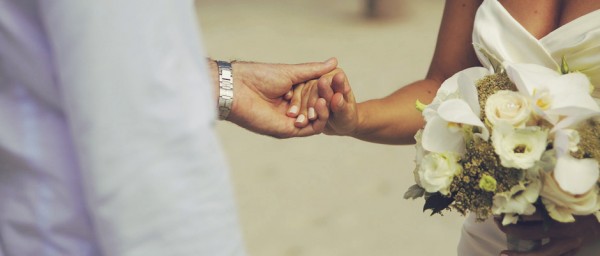The passing of peace, the unity candle, breaking of the glass, tea ceremony and Celtic hand fasting are all examples of the rich variety of rituals that represent interfaith and intercultural weddings of which there are many in the Philadelphia area.

Just because you’ve fallen in love with and plan to marry someone from a different faith doesn’t mean that you have to abandon all that you were brought up with. Actually, quite the contrary.
In order to create custom weddings for interfaith couples, I meet with each couple and spend a lot of time just listening. Using my coaching training, I also ask the couple a lot of powerful questions that gets them really thinking about what their dream wedding ceremony looks like. I then offer the couple a variety of options of different rituals and readings that can be included in their wedding ceremony. I always work with the couple to co-create their ceremony. I like to be really creative, so I encourage the couple to consider including rituals that have meaning to them from either religions or both. Most rituals can be re-invented to be customized so that it feels just right for this particular couple.
One time, for example, I was working with a couple where the bride was Christian while the groom was a non-practicing Jew, but wanted to include something from his heritage. We created a new take on the breaking of the glass ritual. Traditionally, the glass that is broken is a wine glass covered in a napkin. However, this groom was attached to his TV remote control. It was hugely symbolic when at his suggestion, what was covered and to be broken at the ceremony, was his remote control. I was careful to honor and respect this age old Jewish tradition while modernizing it for this couple.
Before I create a first draft of their custom wedding ceremony, I listen. Once I hear from them both during our interview, I ask them each to complete a questionnaire to provide insight into who they are individually as well as a couple.
Generally, the couple is not strict in their religion, or they would likely be seeking clergy from their faith. But, that is not always the case. Sometimes, each may have strong connections to their respective religions and are working to stay connected to their religious beliefs while being respectful of the others.’ Often, regardless of how observant a person is, their customs and family or religious rituals are important. If there is a custom which I am unfamiliar with, I conduct my research. Using the many resources that I have, I can take the desired custom or ritual and weave it into their wedding ceremony.
I usually offer a welcome to the bride and groom and guests and speak to the beauty of the couple and respect that they have for each of their religious backgrounds. I point out that this ceremony is the bringing together of two religions; that nothing is lost and nothing is given up. All is gained as the love of these two families grows.
Additionally:
- Often interfaith couples are so extra sensitive to their differences that they are reluctant to include rituals from their backgrounds. I try to put them at ease by mentioning that being more inclusive of both backgrounds often makes guests more comfortable than avoiding rituals all together.
- Families of the bride and groom, especially the parents, have a huge influence on most couples. The bride and groom want to be respectful and at the same time, they have their own ideas of what they want in their ceremonies. Depending on what the couple wants, I can meet with the parents and talk with them and be inclusive while honoring the fact that the couple is the clients and it is their wedding ceremony.
- Most rituals, despite roots stemming from a particular religion, are not religious in nature by themselves. Most are universal wishes, or customs that anyone would welcome.
- I spend time explaining rituals in the ceremony. I don’t make it a lesson, but in a thoughtful way, I am sure to include a brief explanation of what is about to occur. For example, I just officiated an interfaith wedding this past weekend and both sides remarked over and over about how inclusive the ceremony was and how much they appreciated my explaining each ritual at this Philadelphia area wedding.
Regardless of your religious backgrounds, or your family’s wishes for including rituals from their backgrounds, the important thing to remember is that it is your day and you can create it anyway that feels right for you. I am available to guide you, counsel you, research for you and create for you the best wedding ceremony possible. Congratulations!
~ Jill Magerman, Wedding Officiant, Meaningful Milestones